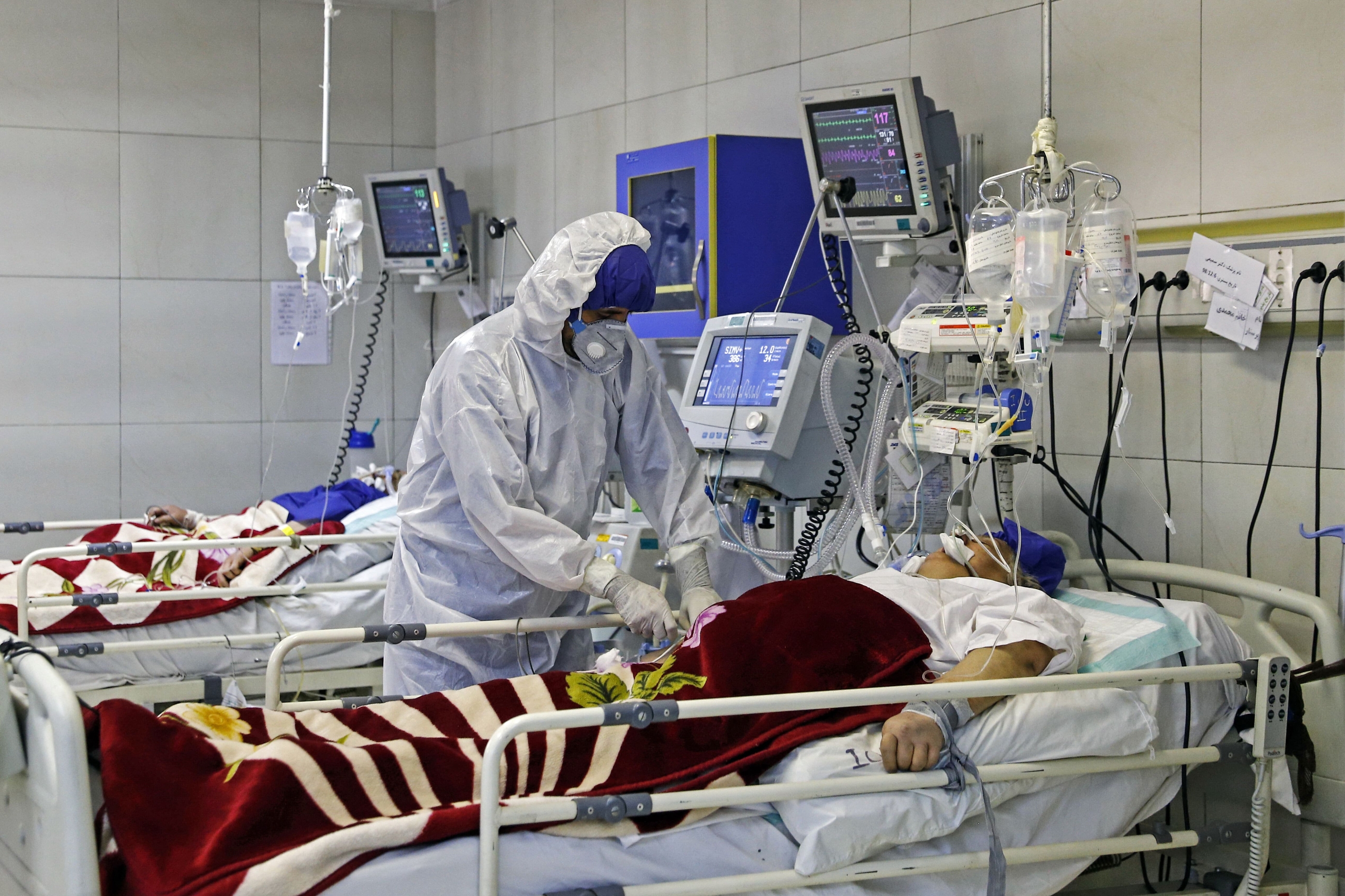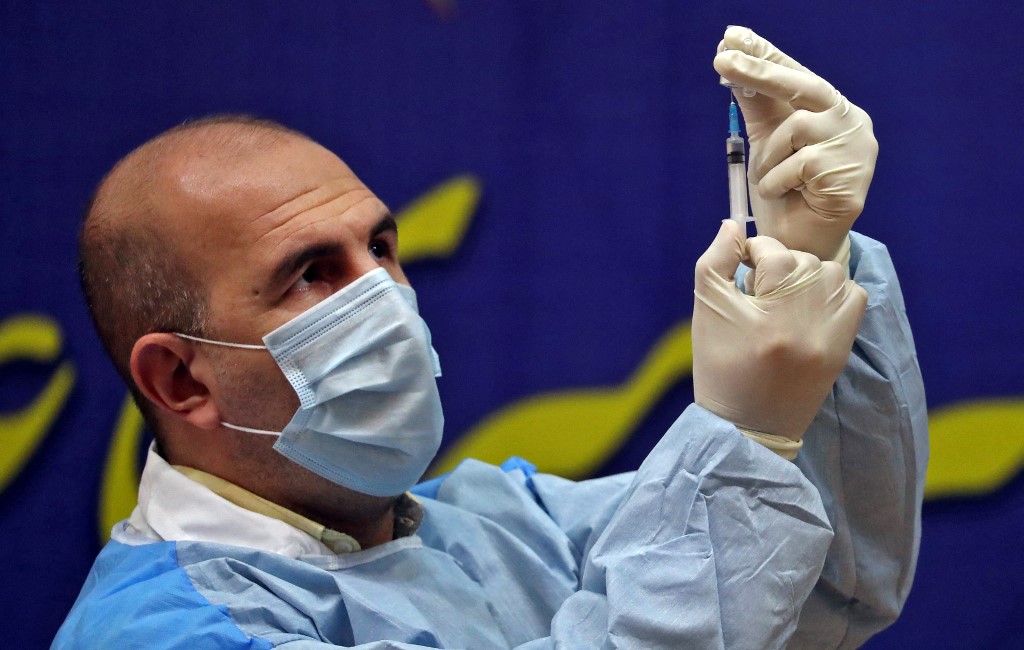Covid-19: Mass medic migration leaves Iran in pandemic panic

Iran is seeing an exodus of its healthcare professionals, including doctors and nurses, who have chosen to take up jobs abroad rather than stay home amid the Covid-19 pandemic.
Over the past 10 months, more than 3,000 healthcare workers have reportedly emigrated from Iran, according to figures released by the Medical Council of Iran, a non-governmental organisation and the main national regulatory body for medical professionals.
Around 200 healthcare workers have died of Covid-19 since the global pandemic began, the council declared.
'When physicians face social, job and welfare tensions, and job insecurity on a daily basis, these all lead them to lose their motivation'
- Mohammad Jahangiri, Medical Council of Iran
The development is especially alarming in a country that has has borne the brunt of the coronavirus pandemic in the Middle East, with a recorded 1.4 million positive cases and more than 57,800 deaths.
A lack of incentives is among the main motives that is driving Iran's healthcare professionals abroad, said Mohammad Jahangiri, a senior official at the Medical Council of Iran.
Stay informed with MEE's newsletters
Sign up to get the latest alerts, insights and analysis, starting with Turkey Unpacked
"When we ask the doctors 'Why are you leaving the country?', they answer that 'We are looking for peace and wellbeing for ourselves and our families'… When physicians face social, job and welfare tensions, and job insecurity on a daily basis, these all lead them to lose their motivation.
“When we don’t create motivations and simultaneously there is a need for doctors in other countries, they leave the country,” said Jahangiri in an interview with a local news agency.
Mina, an experienced nurse, knows the feeling first-hand. She is one of the thousands of healthcare workers who left Iran for pastures new.
She told Middle East Eye that emigration had been on her mind for several years, but it was the pandemic that finally pushed her to take action.
“I thought about going Canada for a few years, but for personal reasons I gave up. With the beginning of the coronavirus outbreak, I felt I had to make very serious decisions about my future. Considering that I had an admission to a university in Austria, I decided to emigrate.”
Working as a nurse in Iran, she faced “difficult working conditions, low salaries, poor social status and a lack of future employment”. But in Austria, during a pandemic, her presence has been much appreciated.
“Due to the fact that I had about 10 years of nursing experience in Iran, I was soon employed and started working in one of the hospitals in Vienna. The hygiene conditions for the medical staff are amazing and I am happy to have made this decision.
“In Iran, unfortunately, we were largely left alone, and for this reason, the number of Covid-19 casualties among medical staff has been very high,” she said.
'We train doctors and send them abroad'
Even before the coronavirus pandemic brought unprecedented challenges to Iran’s healthcare system, the country was already having trouble retaining its medical professionals.
In 2019, a senior health official sounded the alarm on the fast-shrinking numbers of medical professionals working in Iran and a lack of sufficient coverage in primary care.
Iraj Harirchi, Iran’s deputy health minister, revealed that around 15,000 qualified physicians were no longer practising after either emigrating or changing their profession, adding that the country was also losing more than 1,000 nurses annually - mostly to foreign employment.
"For every 1,000 Iranians, there are only 1.6 general practitioners, dentists and specialists, while the minimum ratio needed to meet the country’s demand is 2.5 doctors per 1,000 people,” Harirchi said at the time.
'Nurses cannot easily support themselves with their low income.... this obstacle motivates them to go overseas and not look back.'
- Asal, Iranian nurse
With the World Health Organisation setting its sustainable development goal (SDG) for healthcare coverage at “4.45 doctors, nurses and midwives per 1,000 population” by 2030, Iran has a lot of catching up to do.
Iraj Khosrow-Nia, president of the Iranian Society of Internal Medicine, shared with MEE the reasons he believes are contributing to the exodus of doctors.
“First of all, the income of doctors working in Iran is not as much as their outgoing expenses. The fee for an outpatient appointment is about $2 in Iran, but in neighbouring countries such as UAE, that is more than $20.
“Second of all, the doctors aren’t respected. When our president speaks against the medical community in the parliament, when a parliament member speaks against us, when the state television wants to entertain people by making fun of us, that’s when doctors get disheartened.”
He said Iran spends “at least $50,000 for the education and training” of every single doctor, but many newly qualified practitioners leave the country soon after graduation, so they can work instead of spending years dealing with bureaucracy.
“After graduation, we are required to go out of town in rural areas to work for two years. Then, we must attend two years of conscription and, of course, there is the residency period ahead too. When we enter the job market, we are around 38 or more,” Khosrow-Nia added.
It's a costly business, and Jahangiri blames the government’s lack of foresight for the current trend.
“It takes a person 12 years to get a diploma and 12 years to get a specialty of medicine, which means the government spends 24 years training these doctors, but it does not provide any stimulus to keep them inside the country.
“In fact, we seem to train doctors to [export] them to other countries,” he said.
Nursing crisis
Iran's nursing sector is facing an even more dire reality. Since the pandemic began, some 60,000 nurses have been infected with Covid-19 while working on the frontline.
During the same period, there’s also been a 300 percent increase in emigration applications from nurses, according to a director of Iran’s nurses’ association.
Delays in salary payments, unpunctual or inaccurate payout of coronavirus-related bonuses, and careless human resource handling are just some of the reasons that nurses wish to seek employment abroad.
Another senior member, who spoke on condition of anonymity, told MEE that when Iranian nurses emigrate to other countries, their social status is instantly elevated, and their income is multiplied.
"With the coronavirus outbreak, [some] countries have provided the appropriate incentives for attracting nurses. For example, before the pandemic, an IELTS (English language exam) score of seven or eight was necessary to get admitted for emigration; but after the pandemic, a nurse with [some poor knowledge of] English is accepted," they said.
“Financial incentives are also another thing propelling nurses to emigrate. We have 12,000 graduates from nursing university every year, but their employment rate is low, their income is low too.”
According to a health ministry official, the hourly wage of a nursing student in Iran is around 50,000 rials ($1.19), compared to $33 per hour in Canada.
For Asal, a nurse working in a private hospital in Iran, the large pay gap between doctors and nurses is what makes the situation even more difficult to accept.
“In most countries, doctor and nurse salaries are different, but in Iran, the difference is huge. In Iran, the difference in wages is such that a doctor can easily buy a fancy car after a few years, but a nurse's salary does not even cover their rent," she said.
"My argument is not about why doctors earn more, but why nurses cannot easily support themselves with their low income," Asal added. "This obstacle motivates them to go overseas and not look back.”
Middle East Eye delivers independent and unrivalled coverage and analysis of the Middle East, North Africa and beyond. To learn more about republishing this content and the associated fees, please fill out this form. More about MEE can be found here.







